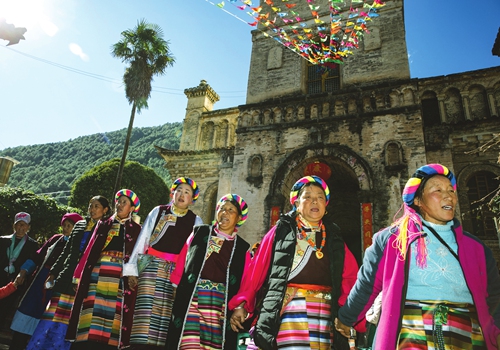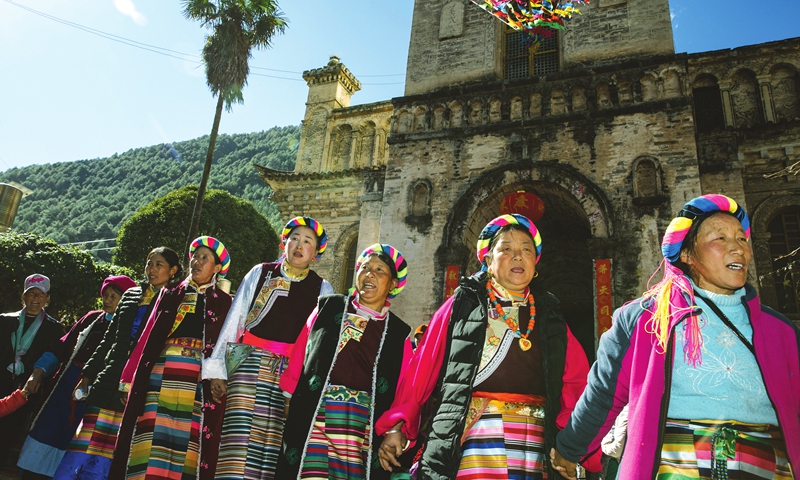
Villagers dance in front of the church to celebrate Christmas on Wednesday in Cizhong, Diqing Tibetan Autonomous Prefecture, Southwest China's Yunnan Province. Photo: Li Hao/GT
Question of whether Chinese people should celebrate Christmas has been raised again during this year's Christmas season. While some like to enjoy the festive atmosphere, there is question over how much attention Chinese should pay to this foreign holiday.
A small group of Chinese internet users recently staged an online boycott of the Christmas saying they refused to celebrate "imported festivals." Hengyang, a city in Central China's Hunan Province, said in a notice a few days ago that people would be prohibited from occupying the roads for Christmas carnival on Christmas Eve.
Hengyang's decision was made out of consideration for maintaining traffic and public order. However, some Western media outlets cited it as a case to accuse China of banning Christmas celebration.
Just go around the streets or shopping malls in China at this time of the year. One can easily feel the festive atmosphere with visible Christmas decorations. China even has developed its own traditions to celebrate Christmas - giving apples wrapped in colorful paper as gifts on Christmas Eve.
Christmas has been continuously celebrated by quite some Chinese people, especially the young, as a commercial and secular holiday. However, it's in essence a religious holiday. A noticeable trend is that voices calling for a Christmas boycott are heard not only in China, but also in other countries including some Muslim-majority countries and even in the US. Some Americans, for avoiding offending people who believe in other religions, choose to wish their friends "happy holidays" instead of "merry Christmas." Why?
With deepening globalization, interactions between different cultures and civilizations are inevitable, during which religious conflicts have intensified. Making Christmas less religious and more secular in fact is conducive to the coexistence of different religions and cultures. It's not aimed at suppressing Christianity, but making Christmas more adaptable to a secular world.
Let's be clear: Christmas celebration management, such as forbidding people from occupying the road as Hengyang does, has nothing to do with excluding foreign culture or restricting religious freedom. The huge achievements China has made since reform and opening-up have been based upon absorbing the essence of Western culture and the country has no reason to close its door to Western civilization now. The number of Chinese Christians has risen from 3.7 million to 44 million over the past 70 years. This growing figure has proven China's commitment to protecting religious freedom.
A string of European countries including France, Belgium, Bulgaria and Austria have enacted their own ban on wearing full-face coverings - including Islamic veils such as the niqab and burqa - in public spaces, to keep social unity and stability. Why cannot China regulate the ways of celebrating Christmas for the same purpose?



